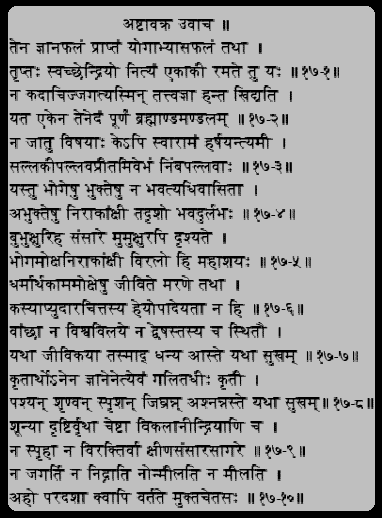



Ashtavakra said:
MHe who is
content, with purified senses, and always enjoys
solitude, has gained the fruit of knowledge and the fruit of
the practice of yoga too. 17.1
The knower of truth is never distressed in this world, for the whole
round world is full of himself alone. 17.2
None of these senses please a man who has found satisfaction
within, just as Nimba leaves do not please the
elephant that
has acquired the taste for Sallaki leaves. 17.3
The man is rare who is not attached to the things he has enjoyed,
and does not hanker after the things he has not enjoyed. 17.4
Those who desire pleasure and those who desire liberation are
both found in samsara, but the great-souled man who desires
neither pleasure nor liberation is rare indeed. 17.5
It is only the noble-minded who is free from attraction or repulsion
to religion, wealth, sensuality, and life and death too. 17.6
He feels no desire for the elimination of all this, nor anger at its
continuing, so the fortunate man lives happily with whatever
sustinence presents itself. 17.7
Thus fulfilled through this knowledge, contented, and with the
thinking mind emptied, he lives happily just seeing, hearing,
feeling, smelling, and tasting. 17.8
In him for whom the ocean of samsara has dried up, there is
neither attachment or aversion. His gaze is vacant, his behaviour
purposeless,and his senses inactive. 17.9
Surely the supreme state is everywhere for the liberated mind.
He is neither awake nor asleep, and neither opens nor
closes his eyes. 17.10
[Translation by John Richards]